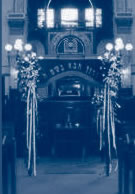|
SEDRA : Miketz Channucah Hertz Chumash
p. 155 Genesis Chap. 41 verse 1
This week's Sedra is generously sponsored by Prof. Leon Mann.
SYNOPSIS:
Two years had elapsed since the chief butler's promise to
Joseph, when Pharaoh, the king of Egypt, had two dreams which
greatly perturbed him. In the first, seven lean cows grazing
on the banks of the Nile devoured seven well-fed cows and
nevertheless remained scrawny. In the second dream, seven
thin ears of corn growing on the banks of the Nile swallowed
up seven full ears of corn and remained thin. Disturbed by
his experience, Pharaoh could find no interpreter among his
counsellors or diviners. It was then that the chief butler,
recalling his previous offence against the king and his promise
to Joseph, told Pharaoh about what had occurred in prison.
Hastily summoned before Pharaoh, Joseph foretold in the name
of G-d, that his dreams meant that seven years of plenty would
be followed by seven years of famine. Their duplication signified
that their fulfilment was imminent. He advised the appointment
of an astute and wise person with authority to appropriate
land and store produce during the seven years of plenty to
provide for the seven years of famine. Pharaoh declared that
in view of his interpretation and excellent advice he could
find no better choice than Joseph himself who, at the age
of thirty, became Viceroy of Egypt. Joseph stored produce
in a number of cities during the seven years of plenty and
when the famine came the stocks were released and sold to
the Egyptians. All the neighbouring countries also suffered
from famine and came to Egypt to buy food. Meanwhile, Joseph
had married Asenat, the daughter of Potiphera, the priest
of On, who bore him two sons, Menasseh and Ephraim before
the years of famine.
The severe famine also afflicted Canaan and compelled Jacob
to send his sons to Egypt to buy produce. Benjamin was not
sent in case he came to harm. As Joseph personally supervised
the sales, all foreign buyers had to appear before him. When
his brothers arrived, Joseph recognised them immediately but
did not disclose his identity (wishing to assure himself that
they had reformed and were truly repentant of their crime
against him). He also recalled his dreams about them. Joseph
spoke harshly and accused his brothers of being spies which
they strongly denied. They explained that they were twelve
brothers, the youngest being left at home with their father
while another brother had "disappeared". If this
were true, answered Joseph, one of them should fetch the young
brother while the others were imprisoned and he placed them
all in custody. After three days, they were released and Joseph
permitted them to take food back for their families. They
were then to return to Egypt with Benjamin so that their story
could be verified. Simeon was to be retained as a hostage
in the interim. The brothers, admonishing each other (in the
Hebrew language), confessed their guilt for their heartless
brutal treatment of Joseph and were reminded by Reuben how
he had tried to save him. Joseph, who understood the conversation,
turned aside and wept.
On the way home, one of the brothers opened his sack to give
food to his ass and found the money paid for the produce.
Not knowing that this had been restored at the command of
Joseph, the brothers greatly feared they would be accused
of theft. On reaching home they gave a full account to Jacob
of all that had happened. On emptying their sacks, they were
horrified to discover that each had received back the money
he had paid. Jacob still resisted sending Benjamin to Egypt
fearing he would suffer the same fate as his brother, Joseph.
The famine in Canaan became so severe that Jacob had no alternative
but to yield to Judah who undertook to become surety for Benjamin's
safety. Taking with them double the money needed to pay for
the produce and gifts of the choicest fruits of the land,
the brothers, this time accompanied by Benjamin, appeared
before Joseph who invited them to dine with him. This compounded
their fears and they informed Joseph's steward how their money
had been returned. He replied that the money must have been
a gift from G-d as the price of the produce had been paid.
He released Simeon from custody.
When Joseph arrived for the meal, he was presented with Jacob's
gifts. On seeing Benjamin, he was overcome with emotion and
shed tears in secret. The brothers were astonished to find
that they were placed at the table in order of their seniority
and that when gifts of clothing were distributed, Benjamin
received a five-fold portion. The next day, Joseph ordered
his men to supply the brothers with food, to return their
money secretly and to place his silver divining goblet in
Benjamin's sack. The brothers set out for home but were soon
overtaken by the steward who accused them of ingratitude by
stealing the goblet. They protested their innocence and readily
agreed to be searched. When the goblet was found in Benjamin's
sack they tore their clothes in grief and returned to the
city. Judah offered himself and his brothers as servants but
Joseph refused to detain any but the offender. Benjamin, he
said, would be detained and the rest were free to return to
their father.
SHABBAT CHANUKAH HERTZ CHUMASH P. 987 Zechariah Ch. 2,
14-17; Ch. 3, 1-10; Ch. 4, 1-7.
The Haphtorah describes a prophetic vision of a menorah flanked
by an olive tree on either side. This vision forms the basis
of the emblem of modern Israel. This haphtorah is read on
Channukah because of the reference to the Menorah which celebrates
the Maccabean victory over the Seleucid Greeks and the miracle
which occurred with the cruse of pure oil. The credo at the
end of the haphtorah sets the tone for the rebuilding of the
Temple and rehabilitation of the nation : "Not by might,
nor by power, but by My Spirit says the Lord of Hosts".
TELL ME RABBI......THE MENORAH
The seven branched Menorah was a prominent ritual object
and sacred symbol of the Sanctuary and the Temple. Light was
the first element to be created by G-d (Genesis 1:3), is itself
a divine element - "Light dwelleth with Him" (Daniel
2:22) and is a symbol of divinity: "The Lord is my light"
(Psalm 27:1).
Light is the kernel of the Kabbalistic conception of Creation.
In mysticism the Menorah symbolises divine creativity, and
the Menorah's components are explained in that context. The
Menorah's oil signifies the dynamic stream or inner creative
spirit which nourishes and infuses all existence. The oil
was replenished each day, to ensure "an everlasting light"
(ner tamid, Exodus 27:20) symbol of G-d's uninterrupted supervision
of the world.
The Menorah also symbolizes the Torah: "For the command
is a lamp and Torah is the light" (Proverbs 6:23). By
radiating its light to Israel, it facilitates the mystic unity
of G-d, the Torah, and Israel. The original Menorah, exquisitely
wrought in solid gold by the divinely inspired artist and
craftsman, Bezalel, was placed in front of the curtain (Parokhet)
partitioning off the Holy of Holies. Hence a Menorah is often
positioned near the Ark in Synagogues. We assume, that Bezalel's
Menorah was destroyed or lost during the siege of Jerusalem
for had it reached Babylon, Ezekiel would have described it
and anticipated its restoration to its rightful place.
A rabbinic tradition contends that Bezalel's Menorah was
hidden away and later retrieved by the returning exiles prompting
the belief that it survived until the destruction of the second
Temple by Titus in the year 70 C.E., and is depicted on the
Arch of Titus of Rome. Thus it may have survived and is possibly
in some vault of the Vatican. However, the Book of Maccabees
states that Antiochus "..... seized .....the candelabra
and all its vessels... and, .... returned (them) to his land."
Furthermore the book states "the Maccabees made new sacred
objects... the Menorah." A talmudic tradition explains
that, due to lack of funds, the first replacement was of iron,
then ... silver and during greater prosperity a Menorah of
gold. It was probably this Menorah which is depicted on Titus'
Arch. The Menorah as depicted on the Arch, has an octagonal
pedestal as displayed on the emblem of the State of Israel,
which was patterned on that of Titus's Arch conflicting with
Jewish sources describing a Menorah with a tripodal base.
BACK TO SHABBAT SHALOM
TABLE
|








